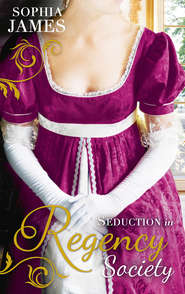По всем вопросам обращайтесь на: info@litportal.ru
(©) 2003-2025.
✖
Regency Surrender: Passionate Marriages: Marriage Made in Rebellion / Marriage Made in Hope
Настройки чтения
Размер шрифта
Высота строк
Поля
She caught the quick nod as he rolled the meat above the embers. The smell of the cooking made her stomach rumble further and, hoping he would not hear it, she shifted in her hard seat of earth.
‘Did your dead husband ever hurt you?’
The question came without any preamble and the shock of it held her numb.
‘Physically, I mean,’ he continued when she did not answer.
‘No.’ Her anger was so intense she could barely grind the lie out.
‘Truly?’
He turned the rabbit again, fat making the fire flare and smoke rise.
‘Truly what?’
‘I am trained to know when people do not tell the truth and I don’t think that you are.’
In the firelight his eyes were fathomless. She had never seen a man more beautiful than him or more menacing.
Just her luck to be marooned in the mountains with a dangerous and clever spy-soldier. She should tell him it all, spit it out and see the pity mark his face. Even her father had failed to hide his reaction when he had found her there, hurt and bound in the locked back bedroom at Juan’s family house, a prisoner to his demands.
‘I think you should mind your own business, Capitán.’
After this the silence between them was absolute and it magnified every other sound present in a busy forest at night.
* * *
Finally, after a good half hour’s quiet, he spoke.
‘Perhaps conversation will be easier again if you eat.’
Taking a small offering from the flame, he split it with his knife, laying it out on another leaf to protect it from the dirt.
Despite herself she smiled. Not a man to give up, she surmised, and not a man to be ignored, either. The rabbit was succulent and well-cooked, but his gaze was upon her, waiting.
‘Do you ever think, Capitán, that if you had your life again you would do some things very differently?’
He took his time to answer, but she waited. Patience was a virtue she had long since perfected.
‘My father and youngest brother drowned in an accident on our estate. It was late winter, almost spring, you understand, and it was cold and the river was running fast.’ He looked at her over the flames and she could see anger etched upon his brow. ‘I couldn’t save them. I couldn’t run fast enough to reach them at the bridge.’
‘How old were you?’
‘Fifteen, so old enough, but I made a mistake with the distance. There was a bend a little further upstream. I could have reached them there if I had thought of it sooner.’
Precision and logic. Everything he ever said or did was underpinned by his mastery of both. He had failed his family according to his own high standards, something that was the core of her shame, as well.
‘If I could go back, I would have killed my husband the first time he ever hit me. I had my knife hidden in my boot.’ She hated the way her voice shook as fury made speech difficult, but still she went on. ‘“Thou shalt not kill” is repeated in the Bible many times. In Matthew and Exodus. In Deuteronomy and Romans. I tried to take heed of the words, but then...’ Her heart beat fierce with memory. ‘The second death of hell is not the worst thing that can happen after all, Capitán. It’s the day-to-day living that does it.’
He nodded and the empathy ingrained in the small gesture almost undid her. ‘You are not the first to think it and you most certainly won’t be the last. But you were made stronger? Afterwards?’
‘Yes.’ No need for thought or contemplation. She knew it to the very marrow of her bones.
‘Then that itself is a gift.’
It was strange but his explanation suddenly eased her terror and the truth of the realisation almost made her cry. She had failed to be a dutiful wife. She had failed in her strict observance of the Bible. She had failed in bearing the heavy stick and fists of a man who was brutal in teaching marital obedience and subservience, but she had survived. And God had made her stronger.
For the first time in a long while she breathed easier. It was a gift.
‘How long have you been here in Spain, Capitán?’
‘Since August of 1808. After a few skirmishes on the way north we ran for the mountains, but the snow beat us.’
‘It was thick this year in the Cordillera Cantabrica. It is a wonder anyone survived such a journey.’
‘Many didn’t. They lay there on the side of the steep passes and never moved again. Those behind stripped them of shoes and coats.’
She had heard the stories of the English dead. The tales of the march had long been fodder for conversations about the fires at the hacienda. ‘Papa said a gypsy had told him once that the French will triumph three times before they are repelled. This is the first, perhaps?’
He only laughed.
‘You do not believe in such prophesy, Capitán?’
‘Generals decide the movements of armies, Alejandra, not sages or soothsayers.’
‘Do you think they will return? The British, I mean. Will they come back to help again, in your opinion?’
‘Yes.’
She smiled. ‘You are always so very certain. It must be comforting that, to believe in yourself so forcibly, to trust in all you say.’
‘You don’t?’
She swallowed. Once she had, before all this had happened, before a war had cut down her family and left her in the heart of chaos.
Now she was not sure of exactly who or what she was. The fabric in her trousers was dirty and ripped and the jacket she wore had come off the dead body of a headless Hussar in the field above A Coruña. It still held the dark stains of blood within the hemline for she had neither the time nor the inclination to wash it. A life lost, nameless and vanished. It was as if she functioned in a place without past or future.
Shimmying across to sit beside him, she took his hand, opening the palm so that she might see the lines in the flame. If he was wary, he did not show it, not in one singular tiny way.
‘There are some here who might read your life by mapping out the junctures and the missing gaps. Juan, my husband, was told he would meet his Maker in remorse and before his time.’ She smiled. ‘At least that came true.
‘Pepe, the gypsy, said that I would travel and become a hidden woman.’ She frowned. ‘He said that I should be the purveyor of all secrets and help those who were oppressed. Juan was not well pleased by this reading. His life ending and mine opening out into another form. I do remember how much I wanted it to be true, though. A separation, the hope of something else, something better.’
His fingers were warm and hard calloused. She wished they might curl around her own and signal more, but they did not.
She couldn’t ever remember talking to another as she had to him, the hours of evening passing in confidences long held close. But it was getting colder and they needed to sleep. It would be tough in the morning with the rain on the mountains and still a thousand feet to climb.
As if sensing her tiredness he let go of her hand and stood.











